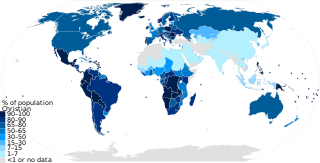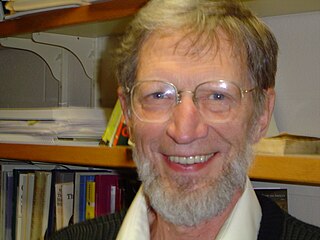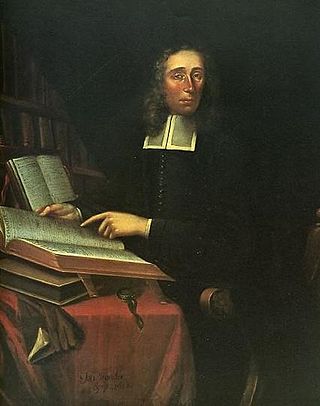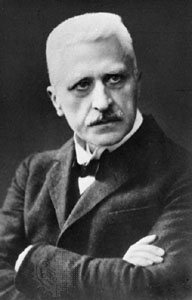
Christendom historically refers to the Christian states, Christian empires, Christian-majority countries and the countries in which Christianity dominates, prevails, or that it is culturally or historically intertwined with.

Cotton Mather was a New England Puritan child prodigy, clergyman, theologian, and writer. Beginning his Harvard College undergraduate education at age twelve, he is the youngest person ever to be admitted there. In 1685, he joined his father, Increase Mather, who eventually became the sixth President of Harvard, as minister of the Congregationalist Old North Meeting House of Boston. He preached there for the rest of his life. Cotton Mather is remembered as one of the most influential Puritan ministers of his day, and was overall, a highly influential figure in early America.
Deism is the philosophical position and rationalistic theology that generally rejects revelation as a source of divine knowledge, and asserts that empirical reason and observation of the natural world are exclusively logical, reliable, and sufficient to determine the existence of a Supreme Being as the creator of the universe. More simply stated, Deism is the belief in the existence of God, solely based on rational thought without any reliance on revealed religions or religious authority. Deism emphasizes the concept of natural theology—that is, God's existence is revealed through nature.
Natural theology, once also termed physico-theology, is a type of theology that seeks to provide arguments for theological topics based on reason and the discoveries of science, the project of arguing for the existence of God on the basis of observed so-called natural facts, and through natural phenomena viewed as divine, or complexities of nature seen as evidence of a divine plan or Will of God, which includes nature itself.

The relationship between religion and science involves discussions that interconnect the study of the natural world, history, philosophy, and theology. Even though the ancient and medieval worlds did not have conceptions resembling the modern understandings of "science" or of "religion", certain elements of modern ideas on the subject recur throughout history. The pair-structured phrases "religion and science" and "science and religion" first emerged in the literature during the 19th century. This coincided with the refining of "science" and of "religion" as distinct concepts in the preceding few centuries—partly due to professionalization of the sciences, the Protestant Reformation, colonization, and globalization. Since then the relationship between science and religion has been characterized in terms of "conflict", "harmony", "complexity", and "mutual independence", among others.

Robert Boyle was an Anglo-Irish natural philosopher, chemist, physicist, alchemist and inventor. Boyle is largely regarded today as the first modern chemist, and therefore one of the founders of modern chemistry, and one of the pioneers of modern experimental scientific method. He is best known for Boyle's law, which describes the inversely proportional relationship between the absolute pressure and volume of a gas, if the temperature is kept constant within a closed system. Among his works, The Sceptical Chymist is seen as a cornerstone book in the field of chemistry. He was a devout and pious Anglican and is noted for his writings in theology.

Alvin Carl Plantinga is an American analytic philosopher who works primarily in the fields of philosophy of religion, epistemology, and logic.

Increase Mather was a New England Puritan clergyman in the Massachusetts Bay Colony and president of Harvard College for twenty years (1681–1701). He was influential in the administration of the colony during a time that coincided with the notorious Salem witch trials.
Polemic is contentious rhetoric intended to support a specific position by forthright claims and to undermine the opposing position. The practice of such argumentation is called polemics, which are seen in arguments on controversial topics. A person who writes polemics, or speaks polemically, is called a polemicist. The word derives from Ancient Greek πολεμικός 'warlike, hostile', from πόλεμος 'war'.
The Boyle Lectures are named after Robert Boyle, a prominent natural philosopher of the 17th century and son of Richard Boyle, 1st Earl of Cork. Under the terms of his Will, Robert Boyle endowed a series of lectures or sermons which were to consider the relationship between Christianity and the new natural philosophy then emerging in European society.

Rudolf Otto was an eminent German Lutheran theologian, philosopher, and comparative religionist. He is regarded as one of the most influential scholars of religion in the early twentieth century and is best known for his concept of the numinous, a profound emotional experience he argued was at the heart of the world's religions. While his work started in the domain of liberal Christian theology, its main thrust was always apologetical, seeking to defend religion against naturalist critiques. Otto eventually came to conceive of his work as part of a science of religion, which was divided into the philosophy of religion, the history of religion, and the psychology of religion.

Michael Ruse is a British-born Canadian philosopher of science who specializes in the philosophy of biology and works on the relationship between science and religion, the creation–evolution controversy, and the demarcation problem within science. Ruse currently teaches at Florida State University.
Criticism of Christianity has a long history which stretches back to the initial formation of the religion in the Roman Empire. Critics have challenged Christian beliefs and teachings as well as Christian actions, from the Crusades to modern terrorism. The arguments against Christianity include the suppositions that it is a faith of violence, corruption, superstition, polytheism, homophobia, bigotry, pontification, abuses of women's rights and sectarianism.
Criticism of atheism is criticism of the concepts, validity, or impact of atheism, including associated political and social implications. Criticisms include positions based on the history of science, philosophical and logical criticisms, findings in both the natural and social sciences, theistic apologetic arguments, arguments pertaining to ethics and morality, the effects of atheism on the individual, or the assumptions that underpin atheism.
Reijer Hooykaas was a Dutch historian of science. He along with Eduard Jan Dijksterhuis were pioneers in professionalizing the history of science in the Netherlands. Hooykaas gave the prestigious Gifford Lectures at St. Andrews in 1975-77. H. Floris Cohen dedicated his historiographical text The Scientific Revolution to Hooykaas; its section on religion deals primarily with Hooykaas.
Margaret J. "Maggie" Osler was a historian and philosopher of early modern science and a professor of history at the University of Calgary.
Deism, the religious attitude typical of the Enlightenment, especially in France and England, holds that the only way the existence of God can be proven is to combine the application of reason with observation of the world. A Deist is defined as "One who believes in the existence of a God or Supreme Being but denies revealed religion, basing his belief on the light of nature and reason." Deism was often synonymous with so-called natural religion because its principles are drawn from nature and human reasoning. In contrast to Deism there are many cultural religions or revealed religions, such as Judaism, Trinitarian Christianity, Islam, Buddhism, and others, which believe in supernatural intervention of God in the world; while Deism denies any supernatural intervention and emphasizes that the world is operated by natural laws of the Supreme Being.
The Book of Nature explores the relationship between religion and science. It is a religious and philosophical concept, originating in the Latin Middle Ages, which views nature as a book for knowledge and understanding.
This is a timeline of philosophy in the 17th century.

Most scientific and technical innovations prior to the scientific revolution were achieved by societies organized by religious traditions. Ancient pagan, Islamic, and Christian scholars pioneered individual elements of the scientific method. Historically, Christianity has been and still is a patron of sciences. It has been prolific in the foundation of schools, universities and hospitals, and many Christian clergy have been active in the sciences, and have made significant contributions to the development of science.









